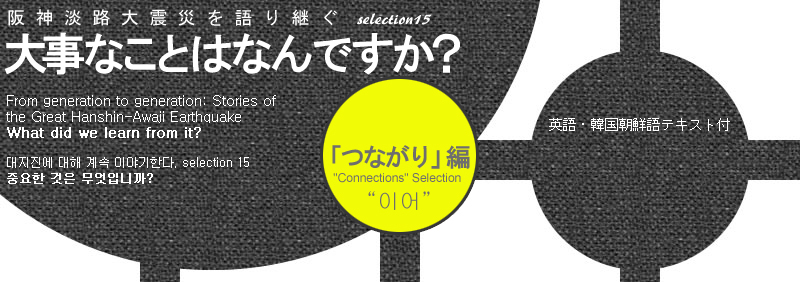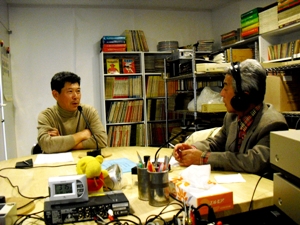Everybody think about fun things to do, and do them
Ying Sheng CAO – Chief Director of Nankin Machi (China Town) Shopping Street Promotion Cooperative
■Earthquake disaster just before the Shunsetsu-sai (Chinese New Year Festival)
The day before the earthquake was the last day of a long weekend holiday, and the shopping street was crowded with visitors. The city was in a shambles after the earthquake. “It’s almost time for the Shunsetsu-sai festival. We have to do something!” That year, January 31 was January 1 (New Year’s Day) according to the lunar calendar, and January 17 was just two weeks before it. We held an emergency general meeting and decided to cancel the festival. First of all, we checked on the safety and whereabouts of the shop and restaurant owners and workers. Fortunately, nobody had died nor was anyone seriously injured.
■Cooking food and soup outdoors for victims on the day of the Shunsetsu-sai
The only food at the time was cold food. “Kobe is a city famous for its food, and we want to provide something hot.” “We want the people to feel even a little happy.” And it was with this desire that we cooked food and soup for the people. Many shops and restaurants had prepared propane gas for the Shunsetsu-sai, so we were able to do the cooking.
■Roshoki and stores around it
Roshoki (Chinese dumpling store) opened on February 1 and gave visitors packets of 10 dumplings free of charge. In stead of that, the store prepared a money donation box. Suppliers and wholesalers had stocks of ingredients, and since there were no customers, there were supplies of flour and mince. On February 3, business as usual was resumed. Some of the stores that reopened early opened the day after the earthquake. “It would be a waste to let the meat rot,” so it was cooked on electric hotplates and sold. I felt the optimism and strength of the overseas Chinese people. A Japanese fish shop owner was stimulated on seeing the Chinese shop owner cooking meat, and said, “I have charcoal”, so he grilled his fish and sold them.
■The importance of friends and companions
Urban reorganization was completed and 10 years had passed since the earthquake. A member of the cooperative I said, “I want the people to return to the city.” 2 or 3 days after the earthquake, for a moment I thought “It might be best to move to Osaka.” However, at the emergency general meeting I felt the eagerness of the members to do something and I felt I should remain here in Kobe and do my best. When you think on your own, you tend to think negatively, but when you are with a group and hear everyone talking, it makes you feel more positive.
■Creating a ‘working’ community
Since my grandfather’s time, I had been helping in Roshoki. With the urban reorganization, and Nankin Machi confirmed as a tourist spot, visitors to Nankin Machi began to increase. It was like having a festival all year long, and I was happy to be working all the time.
■Damage to my home and living as an evacuee
My apartment was on the 11th floor of a condominium and everything that was standing had fallen over. Like in a movie, glass was scattered all over the floor. It wasn’t until a week later when I took a bath that I noticed I had injured the sole of my foot. I temporarily took shelter in the junior high school in front of my apartment. On the first day, after-tremors were terrible and I got no sleep. In the school for Chinese children, not only Chinese, but Japanese people too took shelter.
At the time, I was vice-chief director of the (Nankin Machi) promotion cooperative. At night Nankin Machi was very dark and because I took part in patrols, I decided to leave the evacuation shelter and lived together with 17 relatives, etc. in my shop.
■Gas returned!
In the middle of March we held a ‘recovery festival’ to celebrate the return of the gas supply. In that year, because Kobe Festival was cancelled, we held a ‘Kobe May Festival’ together with Motomachi Shopping Street. Although it rained heavily, we had a marching band and samba dancers who performed for free. Japanese people were thinking if it was right to be celebrating at a time like this and felt they shouldn’t. I suppose we overseas Chinese were a little forceful then.
It was funny that when the earthquake disaster happened, even though traffic signals didn’t work people gave way to each other. People paid more attention. I felt that people’s instincts returned.
■More than anything else, be physically active
Go outdoors, look at things, and talk to people. Doing these steps at a time is important. For us, the outdoor cooking of food and soup for people was the first step. It is important to think of things that make everyone happy and are fun to do and put them into action. For Chinese, money is one way to make a person happy. Using money well to bring people to the town is important.
Besides the Shunsetsu-sai festival, there is the Koryu Shunpu-sai festival from March to early April, and in autumn there is the Chushu-sai (mid-autumn) festival. These are now Kobe tourism attractions.

